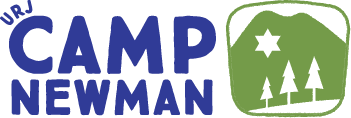by Levi Gettleman, Geza Member
To so many campers, Camp Newman is a Sukkat Shalom, a shelter of peace. Framed by the cornerstones of our CARE values—community, acceptance, role modeling, and each & every one—camp becomes a special place to be oneself. For the many campers who identify as LGBTQ+, camp has been an incredibly powerful space of acceptance and love, yet has also at times been a challenging space to navigate and has not been free of heteronormative and cisnormative biases.
During the summer of 2021, many staff members and campers began to share their experiences of being queer at Camp. These informal conversations led to an acknowledgement of the amount of work needed to be done to create a more inclusive space for people of all genders and all sexual orientations. As a long-time camper and staff member who identifies as gay, I felt personally invested in helping to bring about these changes.
Thus, I became part of Camp Newman’s cohort in the 2022 Keshet Summer Camp Leadership Project. Beginning in March, we attended virtual trainings and began the process of an institutional self-evaluation. We identified some of our strengths and some of the biggest and most important areas of growth. This led to the creation of an action plan with short-term and long-term goals. Many of the changes we dreamed up were instituted in summer 2022 and many more will be instituted in summer 2023 and beyond.
One of the most important steps forward in the realm of gender inclusivity is the availability of all-gender housing. This summer, we had our first all-gender bunks in Rishonim and with our CIT & Avodah teens. These bunks, made up of campers from across the gender spectrum, provided a safe and affirming space for gender-expansive members of our community.
Another major area for growth that we identified were the rituals and procedures of opening day. In recognizing that some campers are registered for camp under a different name then they use, staff members left their cabin-themed nametags blank so that campers could write their name and pronouns correctly. This began a conversation on inclusivity that was carried through camp tours and into cabin time, where campers had age-appropriate conversations about identity while making identity flowers. This first day helped to frame the importance of acceptance as a central value to camp and to Judaism.
Similarly, we set a goal to create programming on LGBTQ+ themes. Many of our older eidot engaged in programming that provided basic definitions of a number of important terms and discussed how to combat implicit (and explicit) biases and microagressions. Additionally, Camp provided a library of resources relating LGBTQ+ experiences and inclusion to Jewish texts and values for staff and Roshei Eidot to use. This spurred the creation of Jewish experiences that centered LGBTQ+ voices and values.
Even with growth in programs, housing, and other policies, I knew from my experience as a queer camper the importance of having space to connect with other members of the LGBTQ+ community at camp. This led to the creation of the LGBTQ+ Affinity space, which met during lunch once every other week, and created a space for LGBTQ+ campers and allies to share their experiences and just be together in a community-building space.
To be part of making changes at camp to create an even safer and more accepting space is a gratifying and meaningful experience. Yet there is still work to do. I am confident that staff members and campers will continue to step up to carry out the next steps in our action plan and grow it further. After all, each of us can change the world for the next generation of campers.
